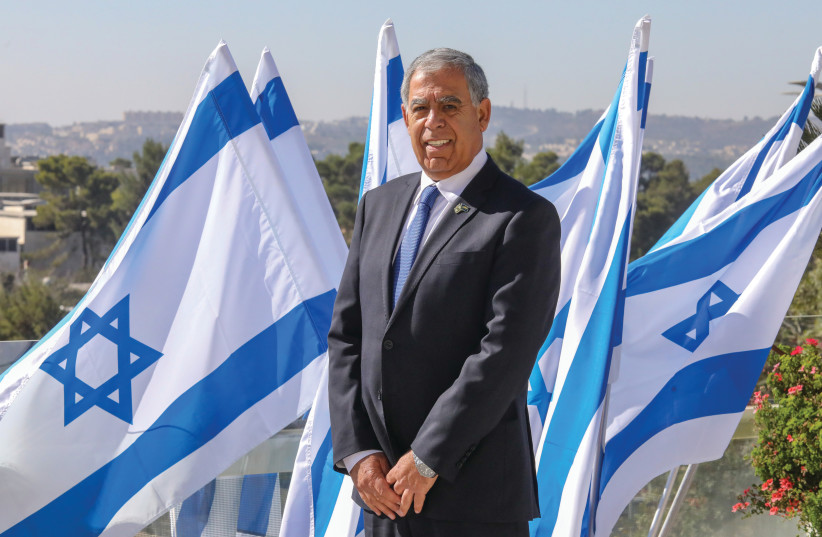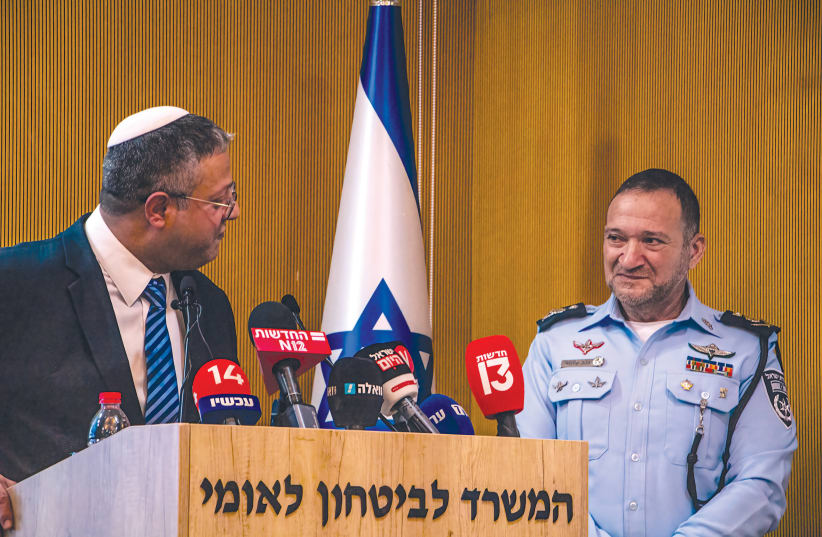
National Security Minister Itamar Ben-Gvir and Israel Police chief Insp.-Gen. Kobi Shabtai unveiled a plan on January 24 to bolster the police force, warning that the country may soon face a new wave of violence. Ben-Gvir, leader of the far-Right Otzma Yehudit party, told a news conference at Israel Police headquarters in Jerusalem that he plans to recruit 4,000 new officers in the next two years, raise salaries by between 20 and 40 percent, and create a national volunteer force of 10,000 civilians.
“I hear from the whole defense establishment that Guardian of the Walls is about to repeat itself,” he said, referring to the IDF operation in May 2021 against Hamas in Gaza that triggered urban violence between Jews and Arabs in Israel. “We must come to Guardian of the Walls 2 prepared.”
Ben-Gvir lamented that the average salary of a police officer ranges from NIS 6,400 to NIS 7,300 a month (about $1,800 to $2,100). Urging officers who had resigned to return to the force, he said: “The police have been underfunded for too long. These heroes work day and night and bring home very little pay. It’s no wonder that 2022 saw twice as many police officers resign as in 2021.”
“The police have been underfunded for too long. These heroes work day and night and bring home very little pay. It’s no wonder that 2022 saw twice as many police officers resign as in 2021.”
Itamar Ben-Gvir
Shabtai agreed. “We must raise salaries throughout the police force and recruit more officers,” he said, adding – in defense of Ben-Gvir – “I see no difference between the guidelines we had when I first took over [in 2021] and the ones we see now.”
Knesset State Control Committee chair MK Mickey Levy (Yesh Atid), a former Jerusalem police chief, disrupted the news conference, waving a copy of the State Comptroller’s Report on Guardian of the Walls (which found, inter alia, that Ben-Gvir had been a “provocateur” of Jewish-Arab violence), accusing Ben-Gvir and Shabtai of boycotting his committee meeting on the issue the previous day.


“They wouldn’t come to the committee, so I came to them,” Levy fumed.
Is Ben-Gvir right? Statements made right before Jerusalem terror attack
The news conference took place a month after the Knesset passed the controversial Police Law, giving the minister of national security unprecedented control over the police. A few days later, on Friday night, January 27, a Palestinian terrorist fired on Israelis outside the Ateret Avraham synagogue in Jerusalem’s Neveh Ya’acov neighborhood, killing seven people. The terrorist fled toward the neighborhood of Beit Hanina, where he was shot dead by officers after running from his car.
Ben-Gvir arrived at the scene of the attack and was briefed by police, returning later with Prime Minister Benjamin Netanyahu, as protesters chanted, “Death to terrorists.” “Our hearts are with the families,” Netanyahu said. “I commend the police officers who took action so quickly. We must act with determination and composure. I call on people not to take the law into their own hands.”
Netanyahu convened his security cabinet, which decided on a series of steps “to fight terrorism and exact a price from terrorists and those who support them.” These included the sealing of terrorists’ homes ahead of their demolition; revoking Israeli ID cards and residency of terrorists’ families; reinforcing military and police units; expanding arrests and operations to collect illegal weapons; easing firearm licensing to enable more Israelis to carry guns; and strengthening settlements in Judea and Samaria.
The Neveh Ya’acov attack was the deadliest since 2011, when terrorists crossed into Israel from Sinai, killing eight Israelis. Is Israel witnessing a new wave of terrorism, and was Ben-Gvir right about predicting Guardian of the Walls 2? The new government’s policy is reminiscent of my interview five years ago with Israeli Nobel laureate Prof. Yisrael (Robert) Aumann, who said his favorite dictum is Si vis pacem para bellum – If you want peace, prepare for war.
